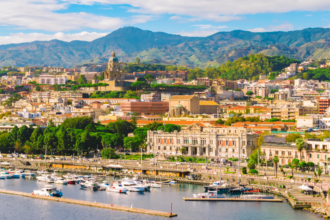Poland welcomed millions of migrants from Ukraine when the war started, many of them driven from the atrocities of battle. Among those seeking safety for her family was 31-year-old Ukrainian mother Svitlana. She loved it so very much. Of her daughter’s first experience in Poland’s schools, Svitlana notes, “there was no bullying.”
Her daughter insisted on attending the same school even after relocating to a new neighborhood. Still, things changed suddenly a few weeks ago. Svitlana’s daughter arrived home one day, distraught. One student had advised her, “Go back to Ukraine.” Still, this was merely the start. Older students teased her for speaking Ukrainian the next day, acting as though they were dodging missiles and yelling “Missile! Get down!”—a nasty allusion to the missile strike in Svitlana’s hometown, which had lately killed scores of people.
There is more than one incident involved here. Reports of increasing bullying, harassment, and bigotry directed toward Ukrainian students abound from Polish institutions. Changing perceptions of Ukrainian refugees in Poland have produced an environment in whereby children, who were once welcomed with compassion, are now being traumatized and attacked.
Is public Polish support for refugees declining?
There was a flood of sympathy when Poland first welcomed Ukrainian migrants. Homes were opened by communities, and people from all walks of life volunteered to provide humanitarian relief including food and clothing to transportation. That was a time of great unity.
But that first sympathy started to fade as the war carried on and the numbers of displaced people rose. A recent study by the CBOS Centre shows that just 50% of Poles today support welcoming Ukrainian immigrants—a dramatic drop from 81% in 2022. This drop is exactly a mirror of the evolving opinions of Ukrainian immigrants in Poland.
Among the several elements influencing this change are political rhetoric, financial pressure, and mounting dissatisfaction over the protracted refugee crisis. Accepting a lot of refugees has long-term effects that Polish people are currently dealing with, which strains public services, housing, and social welfare initiatives. The public’s enthusiasm has thus lessened.
Originally welcomed, several refugees now say they feel excluded or lonely. Discrimination against Ukrainian workers and families has been increasingly reported in public places and businesses. These events seem to many Ukrainians a far cry from the wide arms they first came upon. Read another article on the Ukrainian Belgorod Operations
How Are Elections Changing Public Viewpoint Regarding Refugees?
The political environment in Poland can also help to explain the growing animosity and declining public sympathy for Ukrainian refugees. Candidates are deliberately matching themselves with the mood of the voters as the nation gets ready for a crucial presidential contest. Ukraine has grown to be a major topic in the election, impacting voter attitudes as well as the agendas of the contenders.
Currently running third, far-right contender Slawomir Mentzen has made anti-Ukrainian rhetoric a central component of his campaign. He supports lowering help for Ukraine, contending Poland should give its people top priority above the needs of Ukrainian refugees. Mentzen’s strong position on the matter reflects the growing split in Polish society about the degree of assistance the nation should provide for Ukrainian immigrants.
On the other side, conservative Karol Nawrocki, who comes second in the polls, opposes Ukraine’s EU and NATO membership and has voiced caution about providing further financial support to Ukrainian migrants. While Nawrocki supports the war effort, he is increasingly allied with the idea of limiting the support Poland offers.
In contrast, Rafal Trzaskowski, the front-runner and aligned with the more centrist governing coalition, continues to support Ukraine’s sovereignty but has also promised to reduce social welfare for Ukrainian refugees. His more tempered approach is an attempt to attract centrist votes, but it also illustrates the changing opinions against Ukrainian refugees within the broader electorate.
Public opinion is changing in response to this political change, which is also separating the populace. While some Poles claim that aiding Ukraine has burdened the nation excessively, others still advocate the moral need to assist people in need. Regardless of the perspective, it’s evident that Ukraine’s predicament is no longer a unifying cause—it has become a very dividing subject.
Is Disinformation Fueling the Shift in Perceptions?
The influence of disinformation is a major determinant of the evolving opinions on Ukrainian migrants. Studies show that false information on Ukrainian refugees is being methodically shared online. Russian-backed media sources, which seek to cause strife and division inside Poland, provide most of this false information.
Social media platforms, especially those focused on Eastern Europe, are bombarded with narratives that portray Ukrainians as taking advantage of Polish resources or committing crimes. For example, viral tweets suggest that Ukrainian refugees are “stealing” money from the Polish government or are engaging in violent acts. Many of these assertions are either wholly invented or greatly inflated.
Sensationalism is sometimes used in misinformation campaigns to generate hatred and anxiety. Those who are already on the brink over the refugee issue may find resonance in these tales, which increases their vulnerability to accept misleading narratives. The dissemination of false information is crucial in the shifting perceptions of Ukrainian refugees since it accentuates negative stereotypes and generates mistrust between Polish people and immigrants.
How One Might Turn Negative Trends Around?
Although the evolving opinions on Ukrainian immigrants pose a major obstacle, there are actions one may do to buck the trend. The Polish government has to first and most importantly fund awareness campaigns and educational initiatives to fight false information. Poland can guarantee that refugees are not unfairly denigrated by offering factual information and busting stereotypes.
Particularly, schools have a great deal to contribute. Teachers have to establish a welcoming environment that celebrates cultural variations and promotes empathy. While fostering compassion and solidarity, teachers may help pupils grasp the complicated causes of the refugee situation. This guarantees that Ukrainian youngsters feel protected and supported, therefore helping to reduce bullying and discrimination in schools. Workplaces also need to improve. Companies should aggressively support diversity and make sure Ukrainian immigrants receive just treatment. Organizations have to create a safe environment where refugees can flourish professionally; discrimination cannot be accepted.
Media entities should lastly own the material they publish. Journalists have to be meticulous in confirming facts and making sure they are not helping dangerous false information to proliferate. Media may help to solve rather than contribute to the problem by emphasizing truthful reporting.
Lastly
A complicated mix of elements—political developments, public opinion changes, and the dissemination of false information—is what shapes changing attitudes toward Ukrainian refugees in Poland. Although dislike of immigrants is growing, there are still plenty of chances to buck this trend.
Poland may go back to its compassionate and solidary roots by encouraging understanding, helping education, and tackling the underlying causes of xenophobia. Though the road ahead may be difficult, it is feasible to reestablish the friendly attitude that formerly marked Poland’s reaction to the refugee crisis by means of group effort and knowledge.








